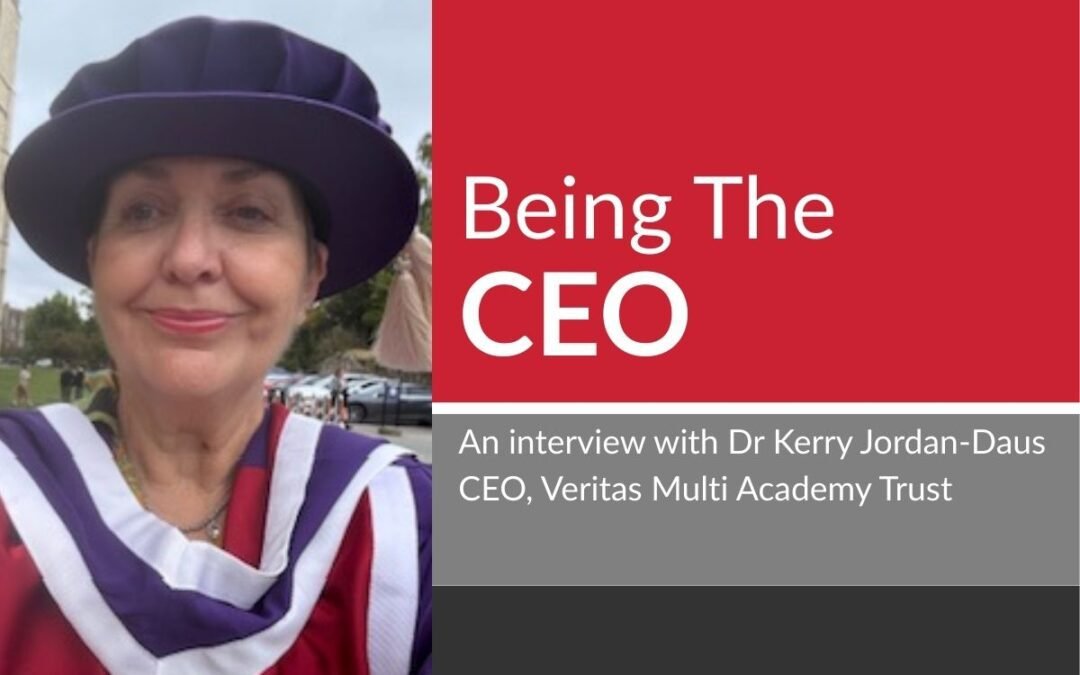Michael Pain – founder of Forum Strategy and author of Being The CEO
“Take care of the minutes and the hours will take care of themselves”
Lord Chesterfield
Last year, Rachael Gacs wrote a superb article on the central importance of goals and priorities to succeeding as CEO. A small, but essential part of ‘keeping on track’ and staying focused as a CEO is time management and personal organisation. Indeed, this is an often-overlooked aspect of leading an organisation and executive leadership development, but can make an enormous difference – particularly in highly reactive and uncertain times. Time management and personal organisation is, in my view, one of the key determiners of strategic success.
As CEOs, we are managing multiple stakeholders – boards, staff, end-users (in your case pupils and parents), regulators, government, suppliers, peers, community leaders and more. We’re also juggling a significant amount of information and managing a lot of (varied) expectations placed upon us. Finding a way of keeping on the ‘front foot’ and avoiding being overwhelmed or overly reactive, is absolutely essential.
Now, what works in terms of time management and personal organisation varies from person to person. What works for one person may not work for another. However, too often CEOs ‘wing’ time management, often using time based on their instincts as in previous roles, and failing to reflect on what really works for them in this unique role. It is impossible to create the necessary habits and processes for managing our time and energy as CEOs if we haven’t reflected on which habits and processes work best for us in the first place. When coaching CEOs, reflecting on time and energy management can often be a defining and transformational moment for a CEO.
Why does all this matter? First, this is a very different role and it is about our wellbeing. If we feel overloaded and out of control – as can easily happen in the CEO role, we tend not to operate as well as when we have a clear sense of what our priorities are – what we have to do and in what order. Secondly, for CEOs, the scale of our responsibilities, the volume of information and the diversity of relationships demands that we take a more reflective and – to a degree – methodical approach to how we use our time and energy on behalf of the organisation. We simply cannot afford to miss important meetings and tasks and descend into operational matters that don’t reflect our (and our trustees’) big goals. Thirdly, if we are clear about those habits that work for us, our team understands how best they can engage with us and work with us and relationships become better as a result.
What this article does not intend to do (for the most part) is to tell CEOs how to spend their time, but simply to provide some practical tips for how they manage it. So what are our practical essentials as CEOs?
The notebook
Having a notebook (physical, if you are still old fashioned like me (!), or online) where you can keep key to do lists, actions and essential information you pick up through your day to day work is essential in my view. I find it a helpful exercise to reflect on and re-write my ‘to do’ list each Sunday evening or Monday morning, ready for the week ahead. I categorise my ‘urgent’, ‘to be done by the end of the week’, ‘nice to have achieved’. Take it to every meeting and interaction, as you will want to add to it and – cathartically – tick things off along the way as you delegate or fulfil your task.
The risk with ‘to do lists’ is they can sometimes drive us if we’re not careful. Be very careful that the tasks and ‘to do’s’ that you set yourself can be justified against your wider goals and objectives as a CEO. Keeping these bigger goals or objectives on the first page of your notebook will mean they are always there to be referred to and to keep you on track! Regularly cross-reference your to do lists and actions against them, and ask questions if the disjoint gets noticeable. When Harvard Business Review asked CEOs about how much of their time was driven by their ‘big agenda’ it varied wildly – from 14% to 80%! If you can edge towards 80% as a CEO, you’re doing very well. This is a key area where CEOs can build effectiveness and impact through their day to day work.
TOP TIP: Start your week with a list of ‘urgent’, ‘ to be done by the end of the week’, and ‘nice to have achieved’ tasks. Be sure to filter them against a statement of your wider goals and objectives as a CEO, so you can keep the main thing the main thing! Be disciplined.
The diary
It is important as CEO to make sure that you have some routine, and this is driven by your diary. A weekly senior team meeting will be familiar to most; less familiar will be non-negotiable time to ‘reflect and think alone’ on a weekly basis (yes the great CEOs make sure this is non-negotiable) and time set aside to simply walk the corridors of your organisation and talk to people. You will also have some very key stakeholders – your Chair, your senior team members, local leaders, and suppliers – who you will need to stay in touch with on a regular and routine basis. The diary can ensure these relationships are not overlooked, but be picky about committing to meeting too many stakeholders on a routine basis – prioritise and put a cap on it! You can meet others less often, or, where appropriate, as required.
There are also some essential tasks that should be diarised, such as writing a blog to update staff across the organisation, writing a monthly column for the town newspaper or update for the RSC, or preparing your CEO report to the board. Again, having these diarised can ensure they are done in good time and with the time and space they deserve. The entry in the diary is the investment.
It is crucially important to dedicate some diary time each week to the diary itself. Sitting down with your PA to consider requests of your time, how you want to use your time to best effect, and strategic medium-term meetings that need to be organised now. Again, referring the requests for meetings and demands of your time against your wider goals and objectives as a CEO is a very useful task. Regular conversations with your PA about what you are prioritising, and your big goals and objectives is time well spent – they need to be inside your head on this to help make your life easier. A great PA is one of the most important investments a CEO can make.
TOP TIP: Have some routine in the diary, but don’t let your routine be all about meetings. Each week set at least a couple of hours aside for strategic thinking and reflection – you are paid to do this – and to walk the corridors of your organisation! Diarise the diary, and be strategic about what’s coming up in the weeks and months to come.
Meetings
As a CEO, our lives are characterised by meetings. According to 2018 research by Harvard business Review, primarily face-to-face interactions, took up 61% of the work time of the CEOs they studied. 24% was spent on electronic communications (see the section on email, next). Who we meet, fhow often, and for what duration tells our staff and our stakeholders a lot about what we value and prioritise as CEOs. It is important to be mindful of that as we fill our diary with meetings. In terms of making the best use of your time in meetings, I suggest the following:
- Ask for the purpose of the meeting. Is it aligned to the organisation’s big goals and objectives and do the outcomes merit the use of the CEO’s time? If not, is it necessary for meeting statutory or regulatory matters? If not, then ask yourself why you are agreeing to it?
- Always request and agree an agenda a few days in advance where possible. For more strategic meetings and for governance, you will wish to be involved in setting the agenda; for others – ask the requestor to share a proposed agenda first and then refine it where necessary;
- Consider (or ask your PA to consider) the duration of the meeting. People will often put one hour in the diary even if this isn’t necessary. Can it be handled in 30 or even 15 minutes?
- Ask the requestor to send some key briefing information beforehand, setting out: the issues to be discussed, how they relate to the organisation’s wider goals and objectives, a summary of key evidence and contextual information available, where members of your team may have already been involved, and what the desired outcome (s) is;
- Make sure clear next steps and actions are noted and look to delegate or distribute to experts on your team as much as possible / appropriate. Communicate these.
- Set a strict time limit on meetings, don’t allow them to overrun except in exceptional circumstances;
- Don’t be late for meetings – they’ll run into the rest of your time, and it also sends a poor message to attendees.
Finally, what is a more efficient use of meeting time than doing it whilst exercising? If you can conduct a one to one meeting whilst having a walk in the sunshine, take the opportunity. Finding time for moderate exercise is a challenge for a CEO, but our health and wellbeing depends on it.
TOP TIP: Set clear agendas and clear desired outcomes beforehand – and stick to time!
Emails
What did we do before emails? As with social media, email tends to want us to react, react, react, and devote all our attention to it. Push back. Now, some emails are urgent, and it’s very helpful to ask your PA to bring these to your attention during the working day. However, most people sending an email to the CEO will consider their message to be important and if an email is really urgent then a phone call should soon follow shortly! As Dwight Eisenhower said: “most things that are urgent are not important, and most things that are important are not urgent”.
My advice is, where possible, to set time aside each day – perhaps 30 to 40 minutes – to review emails, to respond to the most urgent ones, and to perhaps dedicate a further portion of the week to responding to others where necessary. Avoid being reactive through the day. I often find the late afternoon is best as you can mop up and have a sense of the day, rather than in the morning when things are yet to happen. Where you can, ask your PA to respond on your behalf or to pass them on to another senior member of the team where that individual is best placed to handle the request; whilst acknowledging and thanking the sender at the same time, even if not personally on every occasion.
It’s worth acknowledging that social media is similar to email in many ways, and can suck the time and focus from us – with the minutes readily turning into hours. This is a whole separate topic of consideration but, for CEOs, dedicated time for social media monitoring and review (with the help of twitter lists) can ensure this – sometimes – useful tool doesn’t readily turn into one that saps our time and focus from us. There’s also a whole piece here on how social media can sap energy and make us more reactive and less strategic in how we communicate, but that is for another day!
TOP TIP: Where you can, ask your PA to keep track of your emails during the day – monitoring for urgent matters and those things that they can handle or distribute. Set aside 30 – 45 minutes a day for responding to key matters, leaving a dedicated hour or two per week to those that can wait.
Personal time and professional development time
It is all too easy for busy CEOs to encroach on both of these areas. Where we do so, aside from in times of short-term crisis for our organisations, it is usually a failure of our time management approach – not because we are too busy. As Jean De La Bruyere said: “Those who make the worse use of their time are the first to complain of its shortness.”
It is important on both a human and a professional level to protect our personal time, to enrich our lives by time spent with family, friends and on those interests and excursions that make us who we are. There is a risk that we lose our own identify to the corporate identity, and have many regrets in years to come, if we do not. As Tom DeLong puts it, CEOs should be careful not to be “like race car drivers and treat home like a pit stop.” Similarly, time dedicated to coaching and to professional development makes us better, more effective leaders – and these are an investment in ourselves and the organisation. Pushing these out of the diary is almost always a bad investment in ourselves for a short-term fix. Yet, it’s also – understandably – a real temptation in today’s crisis driven world.
TOP TIP: Protect your personal time. Have a ‘cut off’ point that demarcates where your personal time begins. If this is challenging, see your personal and professional development time as a wise investment for the organisation, not simply yourself.
The issues of time management can be all too easily overlooked in a busy CEO role. Yet, it provides one of the most important foundations for impact and success as a Chief Executive.
Copyright Michael Pain 2020. Shared by Forum Education limited with permission of the author.
Michael Pain is the Founder and CEO of Forum Strategy. He is a non-exec, a coach to a number of CEOs, and author of the book ‘Being The CEO’. He designed and delivers the highly acclaimed Being The CEO programme which has now been undertaken by over 40 Chief Executives.


